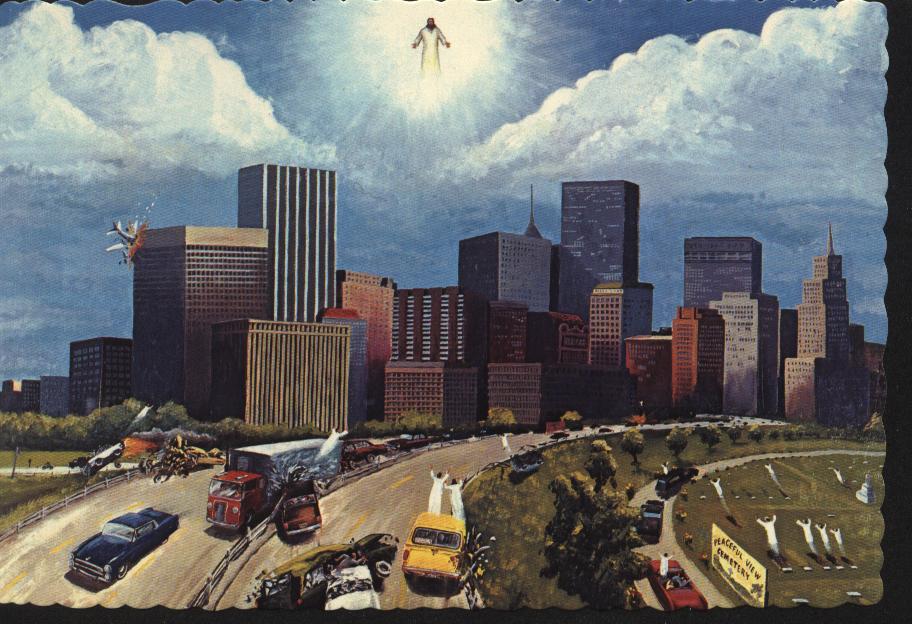Q. People who believe in a pre-tribulation rapture claim that the Bible says the rapture will happen at any time, and we won’t know when. So, this is possible only if the rapture is pre-tribulation. If the rapture is post-tribulation, we would know it is after the 7-year tribulation. What is your view?
A. First, let us start with what the Bible says about rapture, imminent, and imminence, not what people say. While the concept of rapture or translation of Christians to meet the Lord is well-known, the word “rapture” itself does not appear in most English translations in use today. [It appeared once in DBY (Darby Translation, Songs 2:3) and four times in BBE (Bible in Basic English, Ps 28:7, 45:15, 51:8, and Prov 5:19). However, in these cases it is used in the sense of being rapturous, ecstatic, or extreme excitement. This is NOT “a seizing by violence; a hurrying along; rapidity with violence,” which is Webster’s definition and what most Christians understand rapture to mean.]
The adjective “imminent” appeared once in the NASB (New American Standard Bible), AMP (Amplified Bible), and LSB (Legacy Standard Bible) – 2 Pet 1:14, and three times in the NET (New English Translation) – Ps 27:3, Prov 10:14, and Hos 9:7. The noun “imminence” does not appear in contemporary English versions at all. The Greek word for imminent in 2 Pet 1:14 is transliterated tachinos, which means “swift, quick” of events soon to come or impending. Tachinos appeared twice in the Greek NT:
- 2 Pet 1:14 knowing that the laying aside of my earthly dwelling is imminent, as also our Lord Jesus Christ has made clear to me.
- 2 Pet 2:1 But false prophets also arose among the people, just as there will also be false teachers among you, who will secretly introduce destructive heresies, even denying the Master who bought them, bringing swift destruction upon themselves.
In 2 Pet 1:14, Peter was talking about his impending death, while in 2 Pet 2:1, he was referring to punishment that will quickly fall upon the false prophets and teachers. In neither case was he referring to the rapture of the Church.
So, what do pre-tribulation proponents base their claim that “the rapture is imminent” on? They based it on deductions from their interpretation of certain verses, not on direct biblical statements.
Second, let’s review the two primary passages that describe the rapture:
- 1 Thes 4:16-17 For the Lord Himself will descend from heaven with a shout, with the voice of the archangel and with the trumpet of God, and the dead in Christ will rise first. Then we who are alive and remain will be caught up together with them in the clouds to meet the Lord in the air, and so we shall always be with the Lord.
- 1 Co 15:51-52 Behold, I tell you a mystery; we will not all sleep, but we will all be changed, in a moment, in the twinkling of an eye, at the last trumpet; for the trumpet will sound, and the dead will be raised imperishable, and we will be changed.
Note the following:
- The rapture – the resurrection of the dead in Christ followed by those alive being caught up together to meet the Lord – will happen when the Lord descends from heaven. It will be a public event with loud sounds, not a secret rapture. Even pre-tribulation supporters agree that the Lord’s return will be after the tribulation and not before it.
- It will take place in a moment, in the twinkling of an eye, at the last trumpet of God. That is, it will happen very quickly. The text did not say at any moment or imminent, as pre-tribulation proponents claimed.
Then where does the idea of imminence come from? Let me quote a few verses cited by the pre-tribulation school to support their argument:
- Mt 24:36 But of that day and hour no one knows, not even the angels of heaven, nor the Son, but the Father alone.
- Mt 24: 42, 44 “Therefore be on the alert, for you do not know which day your Lord is coming. For this reason, you also must be ready; for the Son of Man is coming at an hour when you do not think He will.
- Mt 25:13 13 Be on the alert then, for you do not know the day nor the hour.
- See also the parallel passage Mk 13:32-37
Their reasoning is since no one knows, not even the Son, the only conclusion is that it could happen at any moment or at any time. If something else needed to happen before the rapture, for example, the great tribulation, then that would be a sign, and we would know. On the surface, that sounds reasonable. But is that the only solution?
When the day or the hour of an event is not known, at any moment is one possible solution. Another possibility is that it is in the future, for which timing is indefinite, with or without signs. For example, when a child is born, the day or the hour of his (or her) death is unknown. Under normal circumstances, the current life expectancy for Canada in 2024 is 83 years. If he (she) has a fatal disease (with signs) or an accident (without signs), the life span would be cut short. The death may be imminent, but not necessarily. The timing of the death is unknown but need not be imminent. Similarly, the rapture’s timing is unknown but need not be imminent. This is simply logic.
Third, any Bible passage’s interpretation must be consistent with the context. What does the context of the quoted passages say?
- The immediate context of Mt 24:36 is the parable of the Fig Tree (Mt 24:32-41), which follows Christ’s glorious return in v 29-30, “But immediately after the tribulation of those days the sun will be darkened, and the moon will not give its light, and the stars will fall from the sky, and the powers of the heavens will be shaken. And then the sign of the Son of Man will appear in the sky, and then all the tribes of the earth will mourn, and they will see the Son of Man coming on the clouds of the sky with power and great glory.” It refers to Christ’s Second Coming after the tribulation, not a pre-tribulation rapture.
- Mt 24:42’s context follows the parable of the Fig Tree, with the Lord warning His disciples to be ready for His coming. The subject has not changed. It is still after the tribulation.
- Mt 25:13’s context is the parable of the Ten Virgins (Mt 25:1-13). In Mt 25, the Lord taught two parables, the Ten Virgins followed by the parable of the Talents (Mt 25:14-30), before describing the Final Judgment (Mt 25:31-46). The entire chapter teaches about Judgment after the tribulation. It is not talking about a pre-tribulation rapture.
You can search other verses cited by pre-tribulation proponents to see whether they support their premise. But my bottom line is: how can we legitimately apply Bible passages describing post-tribulation events to justify a pre-tribulation and imminent rapture? We can’t! Period.
Fourth, one well-known author explained “imminence” as follows:
- Other things may happen before the imminent event, but nothing else must take place before it happens. If something else must take place before an event can happen, then that event is not imminent. In other words, the necessity of something else taking place first destroys the concept of imminency.
Unfortunately, his definition is what destroys their understanding of imminency.
Let me cite two examples in which the biblical characters involved did not expect an imminent rapture would derail what they thought would happen:
- Jn 21:18-19 Truly, truly, I say to you, when you were younger, you used to gird yourself and walk wherever you wished; but when you grow old, you will stretch out your hands and someone else will gird you, and bring you where you do not wish to go.” Now this He said, signifying by what kind of death he would glorify God. And when He had spoken this, He said to him, “Follow Me!” The Lord was prophesying how Peter would die. Remember, according to pre-tribulation supporters, He did not know the day and hour of the rapture. Did He assume an imminent rapture, which could occur before Peter’s death, to nullify His prophecy? I don’t think so.
- What about Paul? Was he an advocate of an imminent rapture by which God would deliver him out of his trials and tribulations? No. When he bid farewell to the Ephesian elders, he said in Acts 20:22-23, 25 And now, behold, bound by the Spirit, I am on my way to Jerusalem, not knowing what will happen to me there, except that the Holy Spirit solemnly testifies to me in every city, saying that bonds and afflictions await me. And now, behold, I know that all of you, among whom I went about preaching the kingdom, will no longer see my face. Paul did not know what would happen to him except that imprisonment and persecution awaited him in Jerusalem. He will not see the elders from Ephesus again. He also knew he would testify in Rome because the Lord told him. Acts 23:11 But on the night immediately following, the Lord stood at his side and said, “Take courage; for as you have solemnly witnessed to My cause at Jerusalem, so you must witness at Rome also.” This must occur before the rapture because the Lord said so, which destroys imminency according to the pre-tribulation school’s definition.
I can continue to provide a rebuttal for other points raised, but this is a short article, and I have written enough to show you my train of thought. If there are issues you want me to address, please specify them, and I would be glad to discuss them when I have time.



